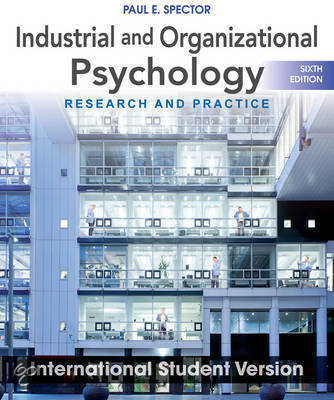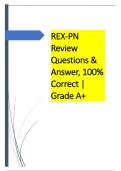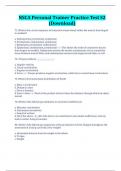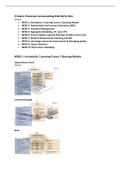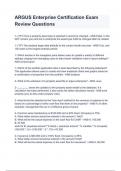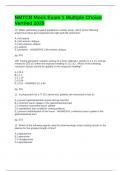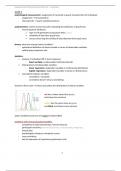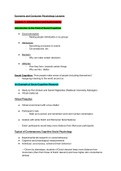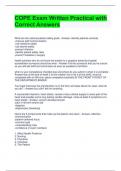Behavior & Environment Notes Lectures
legenda:
!!! = critical note!
@ = example
Lecture 1: Work & Work behavior
A.) Why bother with work as a topic of interest in psychology?
1.) it’s very prevalent; out of more or less 7,5 billion people, more than 3,5 billion people are
employed.
2.) it’s very invasive;
- full-time working people spend more than half of their waking time at work (meaning they spend
time with colleagues more than with family)
- private time is partially spent working (overtime; @70% of dutch working people work overtime
regularly!) or with work-related actions (@commuting), or simply talking about or thinking of work!
3.) work is timeless; it has been done for a long time, and it is here to stay working life will be
prolonged (67+) in order to sustain our social system.
work has a tremendous impact on health, happiness, especially when there’s a misfit between
our work & identity!
Work = beneficial, because:
1.) financial aspects;
- independency
- comfort (@travelling or a nice house)
2.) social aspects;
- opportunities for contacts
- identity (; work as a source of social status & self-esteem)
- coherence, a sense of belonging (; working towards a common goal)
3.) opportunities for lifelong learning and development
4.) structure
- a schedule, something to divide your time to
- something to do; a purpose
all of these contribute to a happier and healthier life; the employed are happier and healthier
than the unemployed
!!! this is a two way street: work happier & healthier individuals, but happier & healthier
individuals make for better employees and have a better position on the market for labor also.
, but work can also have drawbacks:
@ song “factory” – Bruce Springsteen
,; statistics from Eurofound (the European Foundation fort he improvement of living & working
conditions) show:
- that 25% of working people in Europe find work affects their health negatively
- that 37% of working people in Europe find they are confronted by complex tasks often
(;digitalisation simple/routine-based tasks have been taken over by machines)
- that 31% of working people in Europe hide or “fake” feelings, as 75% of people work with other
people, and have to cope somehow (= service acting; hiding your true feelings or acting happily while
not feeling it)
!!! this is a really bad influence on health, as it drains energy (deep acting is better for your health;
finding a reason to make yourself feel positively, despite negativity around you)
work ≠ just another social context, but a very important one that we cannot ignore!
B.) The scope of work & environment psychology
; this field is characterised by a strong interaction with society. Organisations these days operate
differently than 20-30 years ago, in order to compete.
!!! This ≠ just profitable organisations, but also non-profit organisations!)
The pressure to compete translates to the working environment of an individual, as the dynamics
of the organisation reflect the changes in society:
1.) intensification; working more and more often, to produce more!
2.) mentalisation; from agriculture & factories to more “head-oriented” jobs with a focus on
“knowledge & emotion”; a lifelong pressure to learn & specialise, stay employable and anticipate
what is demanded of you as an employer in the future.
3.) flexibilisation; businesses need to be more flexible in order to compete they need tob e able to
respond quickly to rapid changes in society. @businesses cán and need to do business 24/7, be
careful with costs, be innovative, be productive (but with lean production chains that can easily
“move”), and have a flexible organisational structure (= flat, rather than hierarchical)
4.) digitalisation; boring, repetitive tasks became less done by humans, and more by machines; this
means less recovery time in the form of mindless tasks in between work.
5.) prolonged working life; as people’s life expectancy grows, the economical reason (= to maintain
the social system) to work until later in life becomes more urgent.
Life -vs- healthy life
,; life expectancy rises steadily
!!! but what about healthy life expectancy?!
while general life expectancy is increasing steadily, healthy life expectancy is stable; there’s a
discrepancy between the two!
apart from gender (women get older than men), an important factor in healthy life = educational
level:
; educational level influences healthy life through:
1.) work quality (@construction is a much more tough and health affecting job than teaching
2.) lifestyle (@ the lower educated may smoke more, eat less healthy and exercise less)
3.) longer work exposure (@ a lower education means you’re done earlier: you start working earlier
and work longer in the end)
a gap of 20 years between low and high education levels!
what does work & organisational psychology involve?
; the core question =
how can we contribute to people working in a pleasant way their entire life?
There are 3 (overlapping) subdisciplines:
1.) work (&health) psychology:
How should work, work conditions and work and resting times be structured in order to guarantee
work quality and good health, and to optimise performance?
, (@ topics include: job design, fatigue, stress, motivation, sick leave)
2.) organisational psychology:
How should organisations and business processes be structured to make people collaborate as
efficiently and effectively as possible?
(@ topics include: organisational structure & culture, leadership, organisational change, dealing with
resistance)
3.) personnel (= Human Resources) psychology:
How can we ensure an optimal Person-Environment fit in which individual capacities and desires
(continue to) match work demands and opportunities within the organization?
(@ topics include: recruitment & selection, development of competences, performance appraisal,
(financial) reward systems)
(all these are still included in the Master’s programme as of 2020)
C.) History of Work & Organisational Psychology
; Work & Organisational Psychology is almost as old (or young) as psychology itself.
A timeline of important events that have contributed to the field of Work & Organisational
Psychology:
1.) Wundt
(= founding father of empirical psychology) Opened the first laboratory for experimental psychology
in Leipzig in 1879. He did this to learn and form theories.
2.) Münsterberg
; published “Psychological & Industrial Efficiency” (1913).
; was a student of Wundt that wanted to apply what was found in the lab, in order to come up with
solutions for societal topics of interest. He became a well-respected researcher (but lost face as a
German in the U.S. during the 1st world war).
SIMULTANEOUSLY, from a different angle:
engineers looked at how to improve business (timeframe = that the industrial revolution just
happened).
1.) Taylor
; published “Time & Motion studies” (1881-1890), in which he carefully mapped work activities and
legenda:
!!! = critical note!
@ = example
Lecture 1: Work & Work behavior
A.) Why bother with work as a topic of interest in psychology?
1.) it’s very prevalent; out of more or less 7,5 billion people, more than 3,5 billion people are
employed.
2.) it’s very invasive;
- full-time working people spend more than half of their waking time at work (meaning they spend
time with colleagues more than with family)
- private time is partially spent working (overtime; @70% of dutch working people work overtime
regularly!) or with work-related actions (@commuting), or simply talking about or thinking of work!
3.) work is timeless; it has been done for a long time, and it is here to stay working life will be
prolonged (67+) in order to sustain our social system.
work has a tremendous impact on health, happiness, especially when there’s a misfit between
our work & identity!
Work = beneficial, because:
1.) financial aspects;
- independency
- comfort (@travelling or a nice house)
2.) social aspects;
- opportunities for contacts
- identity (; work as a source of social status & self-esteem)
- coherence, a sense of belonging (; working towards a common goal)
3.) opportunities for lifelong learning and development
4.) structure
- a schedule, something to divide your time to
- something to do; a purpose
all of these contribute to a happier and healthier life; the employed are happier and healthier
than the unemployed
!!! this is a two way street: work happier & healthier individuals, but happier & healthier
individuals make for better employees and have a better position on the market for labor also.
, but work can also have drawbacks:
@ song “factory” – Bruce Springsteen
,; statistics from Eurofound (the European Foundation fort he improvement of living & working
conditions) show:
- that 25% of working people in Europe find work affects their health negatively
- that 37% of working people in Europe find they are confronted by complex tasks often
(;digitalisation simple/routine-based tasks have been taken over by machines)
- that 31% of working people in Europe hide or “fake” feelings, as 75% of people work with other
people, and have to cope somehow (= service acting; hiding your true feelings or acting happily while
not feeling it)
!!! this is a really bad influence on health, as it drains energy (deep acting is better for your health;
finding a reason to make yourself feel positively, despite negativity around you)
work ≠ just another social context, but a very important one that we cannot ignore!
B.) The scope of work & environment psychology
; this field is characterised by a strong interaction with society. Organisations these days operate
differently than 20-30 years ago, in order to compete.
!!! This ≠ just profitable organisations, but also non-profit organisations!)
The pressure to compete translates to the working environment of an individual, as the dynamics
of the organisation reflect the changes in society:
1.) intensification; working more and more often, to produce more!
2.) mentalisation; from agriculture & factories to more “head-oriented” jobs with a focus on
“knowledge & emotion”; a lifelong pressure to learn & specialise, stay employable and anticipate
what is demanded of you as an employer in the future.
3.) flexibilisation; businesses need to be more flexible in order to compete they need tob e able to
respond quickly to rapid changes in society. @businesses cán and need to do business 24/7, be
careful with costs, be innovative, be productive (but with lean production chains that can easily
“move”), and have a flexible organisational structure (= flat, rather than hierarchical)
4.) digitalisation; boring, repetitive tasks became less done by humans, and more by machines; this
means less recovery time in the form of mindless tasks in between work.
5.) prolonged working life; as people’s life expectancy grows, the economical reason (= to maintain
the social system) to work until later in life becomes more urgent.
Life -vs- healthy life
,; life expectancy rises steadily
!!! but what about healthy life expectancy?!
while general life expectancy is increasing steadily, healthy life expectancy is stable; there’s a
discrepancy between the two!
apart from gender (women get older than men), an important factor in healthy life = educational
level:
; educational level influences healthy life through:
1.) work quality (@construction is a much more tough and health affecting job than teaching
2.) lifestyle (@ the lower educated may smoke more, eat less healthy and exercise less)
3.) longer work exposure (@ a lower education means you’re done earlier: you start working earlier
and work longer in the end)
a gap of 20 years between low and high education levels!
what does work & organisational psychology involve?
; the core question =
how can we contribute to people working in a pleasant way their entire life?
There are 3 (overlapping) subdisciplines:
1.) work (&health) psychology:
How should work, work conditions and work and resting times be structured in order to guarantee
work quality and good health, and to optimise performance?
, (@ topics include: job design, fatigue, stress, motivation, sick leave)
2.) organisational psychology:
How should organisations and business processes be structured to make people collaborate as
efficiently and effectively as possible?
(@ topics include: organisational structure & culture, leadership, organisational change, dealing with
resistance)
3.) personnel (= Human Resources) psychology:
How can we ensure an optimal Person-Environment fit in which individual capacities and desires
(continue to) match work demands and opportunities within the organization?
(@ topics include: recruitment & selection, development of competences, performance appraisal,
(financial) reward systems)
(all these are still included in the Master’s programme as of 2020)
C.) History of Work & Organisational Psychology
; Work & Organisational Psychology is almost as old (or young) as psychology itself.
A timeline of important events that have contributed to the field of Work & Organisational
Psychology:
1.) Wundt
(= founding father of empirical psychology) Opened the first laboratory for experimental psychology
in Leipzig in 1879. He did this to learn and form theories.
2.) Münsterberg
; published “Psychological & Industrial Efficiency” (1913).
; was a student of Wundt that wanted to apply what was found in the lab, in order to come up with
solutions for societal topics of interest. He became a well-respected researcher (but lost face as a
German in the U.S. during the 1st world war).
SIMULTANEOUSLY, from a different angle:
engineers looked at how to improve business (timeframe = that the industrial revolution just
happened).
1.) Taylor
; published “Time & Motion studies” (1881-1890), in which he carefully mapped work activities and

